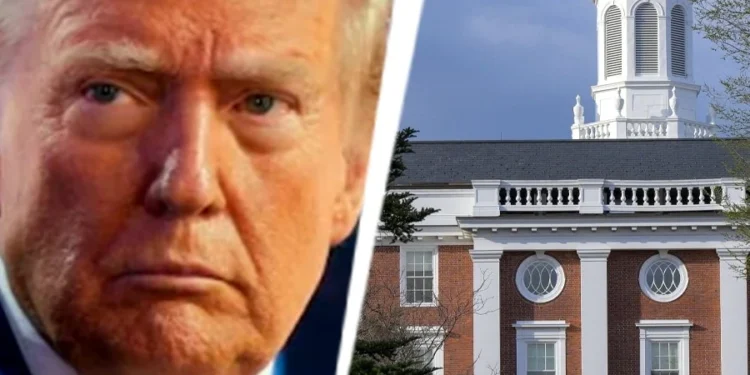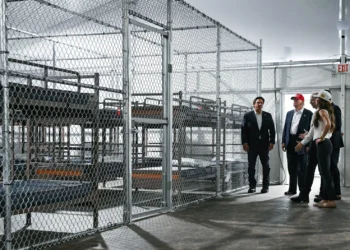The Trump administration has made a significant move by halting Harvard University’s ability to enroll international students, sparking a heated debate. This decision targets a crucial funding source for the nation’s oldest and wealthiest college.
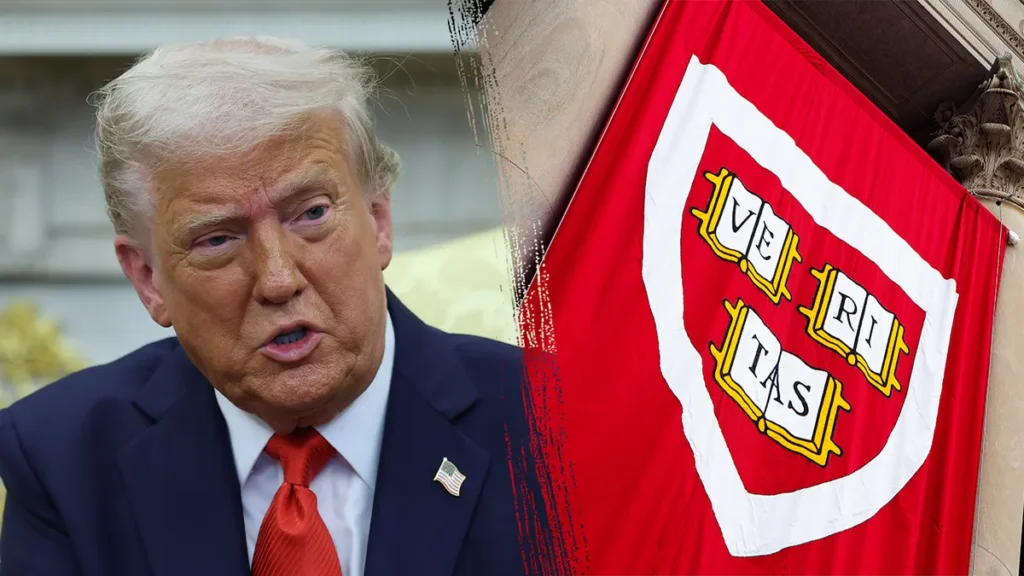
The administration’s decision has been met with resistance from Harvard, which has termed the move “unlawful” and is preparing to take legal action. The implications of this decision are far-reaching, affecting not just Harvard but also its students and the broader academic community.
Key Takeaways
- The Trump administration has halted Harvard’s ability to enroll international students.
- Harvard has called the move “unlawful” and is preparing legal action.
- The decision affects a crucial funding source for Harvard.
- The move has sparked a heated debate in the academic community.
- Current international students at Harvard may face visa status risks.

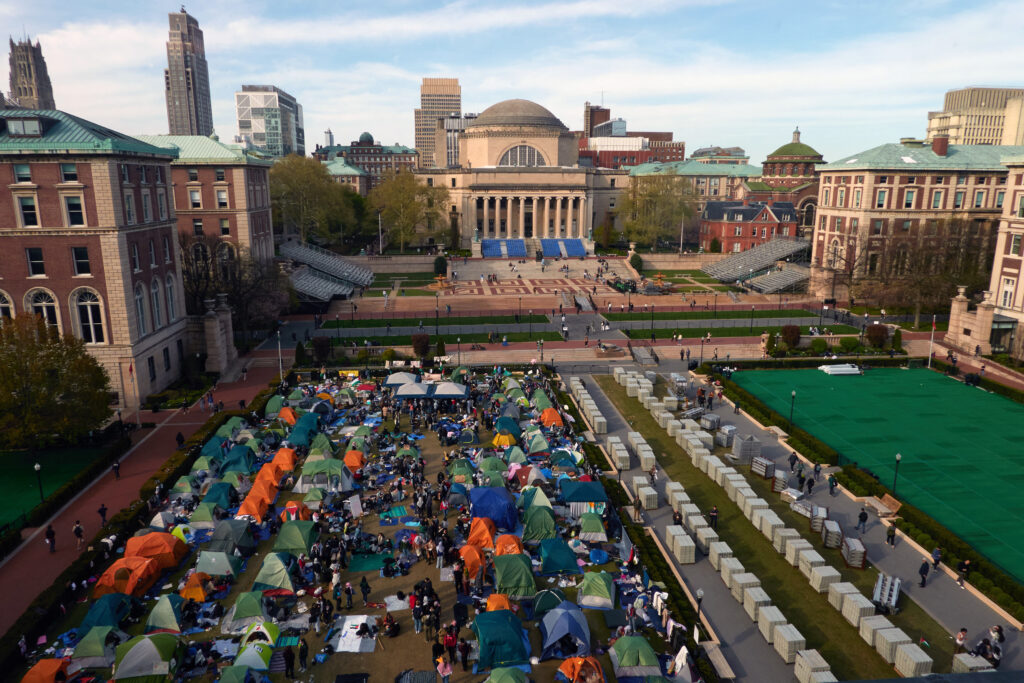
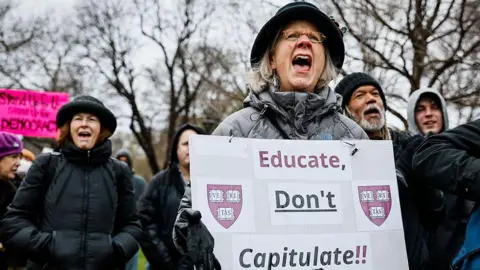

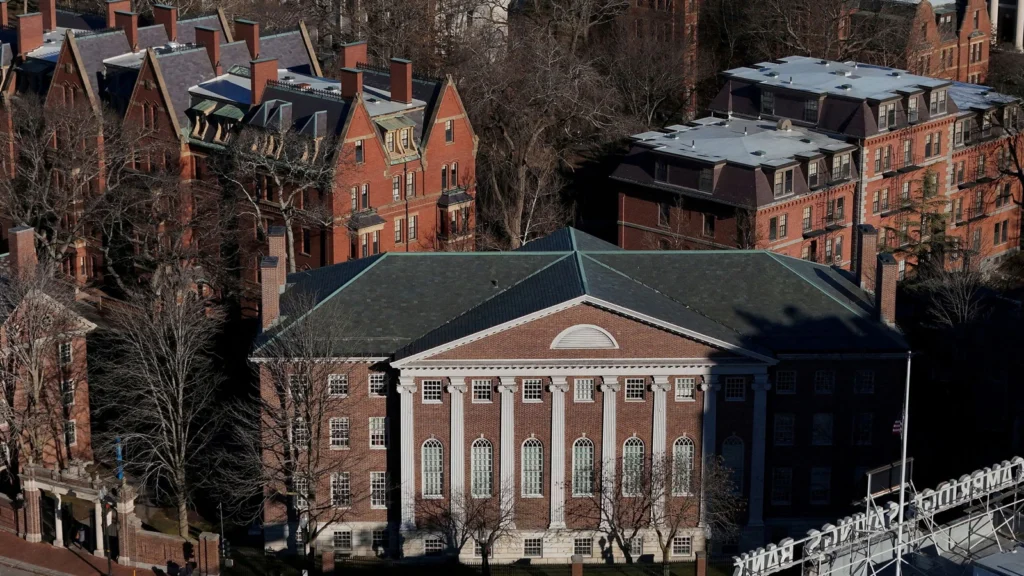

The Trump Administration’s Decision Against Harvard
The Trump administration’s latest move against Harvard University has sparked controversy over international student enrollment. This decision, directly impacting the university’s ability to enroll international students, has been met with significant backlash from the academic community.
Details of the DHS Ruling on International Student Enrollment
The DHS ruling on Harvard’s Student and Exchange Visitor Program certification has far-reaching implications. The decision affects not only currently enrolled international students but also prospective students who were planning to join Harvard in the upcoming academic year. The ruling has raised questions about the future of international education in the United States.
The DHS decision highlights the complexities of immigration policies and their impact on educational institutions. Harvard University, known for its diverse student body and global outreach, is particularly affected by this ruling.
Official Justification for the Decision
According to the Trump administration, the decision to revoke Harvard’s certification is part of a broader effort to enforce immigration laws more strictly. The administration argues that this move is necessary to prevent potential abuses of the student visa system. However, critics argue that this decision is unlawful and discriminatory, targeting institutions like Harvard that have a history of welcoming international students.
The official justification for the decision also points to concerns over campus policies and the handling of student visas. Kristi Noem’s statements on Harvard’s policies have been cited as part of the administration’s rationale, highlighting the political context surrounding the decision.
Harvard’s Immediate Response to the Ban
Harvard University has swiftly reacted to the administration’s ruling, condemning the action as unlawful and vowing to protect its international students. The university’s leadership has been vocal about their disagreement with the decision, emphasizing the potential harm it could cause to the students and the academic community.
University’s Official Statement Condemning the Action
The university released an official statement saying,
“The response is clear: the government’s action is unlawful, and we will do everything in our power to protect our students and maintain our academic mission.”
This statement underscores Harvard’s commitment to standing by its students and upholding its academic integrity in the face of adversity.

Harvard’s Commitment to Protecting International Students
Harvard has a long history of welcoming international students and has consistently worked to create an inclusive environment. The university is now taking steps to legally challenge the administration’s decision, ensuring that its international students are protected. By doing so, Harvard is not only standing up for its students but also for the principles of academic freedom and diversity.
The university’s commitment to its international students is unwavering, and it is exploring all available legal avenues to safeguard their interests. This includes potentially filing a lawsuit against the Department of Homeland Security (DHS) for its ruling.
Harvard International Students Face Uncertain Future
The future of Harvard’s international students hangs in the balance as the Trump administration’s decision casts a shadow over their academic pursuits. This uncertainty affects not only those currently enrolled but also prospective students who had plans to join the Harvard community.
Impact on Currently Enrolled Students
Currently enrolled international students at Harvard are facing a myriad of challenges due to the administration’s ruling. Many are concerned about their ability to continue their studies without interruption. The announcement is devastating, as one international student, Leo Gerdén, noted, “It could be all the legal resources suing the Trump administration, whatever they can use the endowment to, whatever they can use their political network in Congress.”
The uncertainty is not just about the legal battle; it’s also about the day-to-day life of these students. Some key concerns include:
- Potential disruptions to their academic programs
- Uncertainty about visa status and potential deportation
- Emotional distress due to the sudden change in their status
Prospective Students Left in Limbo
Prospective international students who were planning to join Harvard are now left in limbo. The decision has created a cloud of uncertainty around their future academic plans. Many had already made significant preparations to join the Harvard community, including securing funding and arranging travel.
The impact on prospective students can be broken down into several areas:
- Admission Process: Uncertainty about whether they will be allowed to enter the country if admitted.
- Financial Planning: Difficulty in planning financially due to the uncertainty surrounding their potential enrollment.
- Alternative Plans: The need to consider alternative educational paths in other countries.
As Harvard navigates this challenging situation, the university’s commitment to supporting its international students remains a priority. The unfolding legal battle and the administration’s response will be crucial in determining the future for these students.
Legal Basis of Harvard’s Challenge Against the Administration
In response to the administration’s move, Harvard has mounted a legal challenge, arguing that the decision is unlawful. This challenge is grounded in a thorough analysis of relevant immigration laws and regulations.

Analysis of Relevant Immigration Laws and Regulations
Harvard’s legal team is scrutinizing the Immigration and Nationality Act (INA) and other pertinent laws to build their case against the Trump Administration. The university asserts that the administration’s decision violates federal law and constitutional rights of international students.
“The government’s action is unlawful… We are fully committed to maintaining its ability to host international students and scholars.” – Harvard’s official statement
The analysis involves examining the Administrative Procedure Act (APA), which governs the process by which federal agencies, like the Department of Homeland Security (DHS), issue regulations and decisions. Harvard’s challenge likely argues that the DHS failed to comply with the APA’s requirements, rendering their decision arbitrary and capricious.

Precedents for Harvard’s Legal Challenge
Harvard’s legal challenge is not without precedent. There have been numerous instances where educational institutions have successfully challenged government decisions in court. For example, universities have previously contested immigration policies that adversely affected international students and scholars.
The outcome of Harvard’s challenge could set a significant legal precedent, influencing how future administrations handle similar issues. By invoking relevant laws and past judicial decisions, Harvard aims to protect not only its current and prospective international students but also potentially impact broader immigration policies.
The Escalating Conflict Between Trump Administration and Elite Universities
The Trump administration’s efforts to revamp private colleges and universities have led to a heightened clash with elite institutions like Harvard. This conflict is not new but has been escalating over the past few years, with various policy clashes and ideological differences coming to the forefront.
Previous Tensions and Policy Clashes
The Trump administration has been critical of what it perceives as a prevalence of liberal ideologies in higher education. This criticism has manifested in various policy decisions aimed at influencing the direction of elite universities. For instance, the administration has questioned the use of DEI policies, viewing them as potentially divisive or as promoting a particular political agenda.
One of the significant areas of contention has been the administration’s stance on immigration policies and their impact on international students. Elite universities like Harvard have been vocal about their opposition to certain policies that they believe unfairly target international students or hinder their ability to study in the United States.
The Role of DEI Policies in the Dispute
DEI policies have become a focal point in the conflict between the Trump administration and elite universities. The administration has expressed concerns that these policies may be used to promote a specific ideological viewpoint or to discriminate against certain groups. On the other hand, universities argue that DEI initiatives are essential for creating an inclusive and diverse educational environment.
The debate over DEI policies reflects broader ideological differences between the Trump administration and elite universities. While the administration views certain policies as overly politicized or contrary to its agenda, universities see them as crucial for fostering a welcoming and equitable campus culture.
The conflict is likely to continue as both sides hold strong convictions about the role of higher education in American society. As the situation evolves, it will be important to monitor how these tensions impact not only the universities directly involved but also the broader higher education landscape in the United States.
Kristi Noem’s Connection to the Harvard Controversy
Kristi Noem’s connection to the Harvard controversy stems from her stance on international students and university policies. As a prominent figure, her opinions have significant weight in the ongoing debate.

Noem’s Statements on Harvard and Campus Policies
Kristi Noem has been vocal about her views on universities enrolling international students. She stated,
“It is a privilege, not a right, for universities to enroll foreign students and benefit from their higher tuition payments to help pad their multi-billion dollar endowments.”
This statement reflects her perspective on the issue and highlights the financial aspects of international student enrollment.
The implications of Noem’s statement are multifaceted. On one hand, it underscores the financial benefits that universities derive from international students. On the other hand, it raises questions about the fairness and equity of policies that favor domestic students over international ones.
Political Context of the Administration’s Actions
The Trump administration’s decision to halt Harvard’s international student enrollment is part of a broader political context. The administration has been known for its strict immigration policies, and this decision aligns with those efforts.
A comparison of the administration’s actions and their potential impacts is provided in the table below:
| Policy Action | Potential Impact |
|---|---|
| Halting international student enrollment | Reduced revenue for universities |
| Strict immigration policies | Increased scrutiny for international students |
| Support from lawmakers like Kristi Noem | Enhanced political backing for the administration’s stance |
The political context also involves the role of lawmakers like Kristi Noem, who provide political backing for the administration’s actions. Their support is crucial in shaping the narrative and influencing public opinion on the matter.
In conclusion, Kristi Noem’s connection to the Harvard controversy is rooted in her statements on international students and university policies. The political context of the administration’s actions adds complexity to the issue, with potential implications for universities and international students alike.
Potential Implications for Other Ivy League and US Universities
Could other Ivy League schools be next on the administration’s list? The decision to halt Harvard’s international student enrollment has raised concerns among other prestigious universities in the US.
The ruling has sparked a mix of worry and solidarity among Ivy League universities, with many wondering if they could be the next target. The collective response from higher education institutions is expected to be significant, given the potential implications for their international student programs.
Are Other Universities at Risk of Similar Actions?
The Trump administration’s move against Harvard has set a concerning precedent for other US universities. Institutions like Yale, Stanford, and MIT, which also have large international student populations, are likely to be watching the situation closely.
The risk of similar actions against other universities is not negligible, given the administration’s strict stance on immigration policies. This has led to a heightened sense of uncertainty among international students and university administrators alike.
Collective Response from Higher Education Institutions
In response to the administration’s decision, many higher education institutions are likely to band together to challenge the ruling. This collective response could involve joint legal actions, public statements, or lobbying efforts to influence policy changes.
The solidarity among universities is expected to be a crucial factor in determining the outcome of Harvard’s challenge against the administration. By standing together, these institutions can demonstrate their commitment to protecting international students and maintaining the integrity of their educational programs.
International Reaction and America’s Standing as a Global Education Leader
As news of the Trump administration’s move against Harvard spread, the global community began to weigh in on the implications. The decision has sparked a significant international reaction, with various countries and educational institutions expressing their concerns and apprehensions.

Responses from Countries with Large Student Populations at Harvard
Countries with a substantial number of students enrolled at Harvard have been particularly vocal. For instance, China and India, two of the largest sources of international students at Harvard, have expressed concern over the potential long-term implications of this decision on their citizens’ educational aspirations in the United States.
The Chinese government has issued a statement urging the U.S. to reconsider its policy, emphasizing the importance of educational exchange between the two nations. Similarly, Indian officials have raised concerns about the potential impact on their students’ future opportunities in the U.S.
Impact on America’s Global Standing in Education
The decision has raised questions about America’s standing as a global education leader. Will this decision hurt America’s reputation as a top destination for global talent? Many educators and policymakers fear that it could deter international students from choosing the U.S. for their higher education, potentially benefiting other countries like Canada, Australia, and the UK.
The potential loss of international students could have far-reaching consequences, including a decline in the diversity of U.S. campuses and a reduction in the global competitiveness of American universities. As one education expert noted, “The U.S. has long been the preferred destination for the world’s best and brightest students. Any policy that undermines this status could have significant long-term consequences for American higher education.”
Legal Pathways and Potential Outcomes
The Trump administration’s move to halt Harvard’s international student enrollment has sparked a legal battle, with Harvard vowing to use ‘all available legal resources’ to challenge the decision. This commitment underscores the university’s determination to protect its international students and maintain its global academic standing.
Harvard’s Legal Strategy
Harvard’s legal team is exploring various legal options to challenge the administration’s decision. This includes filing a lawsuit against the Department of Homeland Security (DHS) and seeking injunctive relief to prevent the enforcement of the new policy.
The university’s strategy involves leveraging relevant immigration laws and regulations to argue that the administration’s action is unlawful and constitutes an overreach of executive authority.
Possible Timelines and Scenarios
The timeline for the legal proceedings will depend on several factors, including the court’s schedule and the complexity of the case. Possible scenarios include a preliminary injunction being granted, which would temporarily halt the enforcement of the new policy, or a full-scale trial to determine the legality of the administration’s action.
- A preliminary injunction could be granted within weeks, allowing international students to continue their studies without interruption.
- A prolonged legal battle could extend over several months, potentially into the next academic year.
- A favorable ruling for Harvard could set a precedent for other universities facing similar challenges from the administration.
As the legal process unfolds, Harvard remains committed to supporting its international students and ensuring that they are not unfairly penalized by the administration’s actions.
Conclusion: The Future of International Education at Harvard
Harvard University remains committed to maintaining its ability to host international students and scholars, as stated in their official response to the Trump administration’s decision.
The future of international education at Harvard University hangs in the balance as the institution challenges the administration’s ruling. With a strong commitment to protecting its international students, Harvard is poised to navigate the complexities of this policy.
The impact of this decision on Harvard’s international student population and the broader implications for US universities will continue to unfold. As the situation develops, Harvard’s resolve to uphold its values and mission will be put to the test.
Ultimately, the outcome of this dispute will shape the future of international education at Harvard and potentially influence the trajectory of global education at US universities.
FAQ
Why did the Trump administration ban Harvard international students?
The Trump administration revoked Harvard’s ability to enroll international students, citing reasons that Harvard has deemed “unlawful”. The exact justification for the decision is still unclear, but it is believed to be related to the university’s policies and practices.
Can Harvard still accept foreign students after the DHS ruling?
The DHS ruling has halted Harvard’s ability to enroll new international students, but the university is exploring legal options to challenge the decision. Currently enrolled international students are likely to be unaffected, but prospective students are left in limbo.
What happens to current Harvard international students?
Currently enrolled international students at Harvard are likely to be allowed to continue their studies, but the university’s ability to support them may be impacted by the DHS ruling. Harvard has committed to protecting its international students and is working to mitigate the effects of the decision.
How will Harvard fight the Trump administration’s decision?
Harvard is preparing to take legal action against the Trump administration’s decision, citing the “unlawful” nature of the ruling. The university is analyzing relevant immigration laws and regulations, as well as precedents for its legal challenge.
What is the impact of the DHS ban on Harvard’s international enrollment?
The DHS ban has effectively halted Harvard’s ability to enroll new international students, which could have significant implications for the university’s diversity and global standing.
Will Harvard sue the Trump administration over the student ban?
Harvard is preparing to take legal action against the Trump administration’s decision, which may include filing a lawsuit. The university is exploring its legal options and strategy.
How many international students are affected at Harvard?
Harvard has a significant population of international students, and the DHS ruling is likely to impact both currently enrolled and prospective students.
What is Kristi Noem’s connection to the Harvard controversy?
Kristi Noem has made statements on Harvard and campus policies, which may be related to the Trump administration’s decision. The political context of the administration’s actions is still unclear.
Are other universities at risk of similar actions?
The Trump administration’s decision may set a precedent for other universities, particularly those with large international student populations. The collective response from higher education institutions will be crucial in determining the impact of the ruling.
How does the SEVP certification work, and what is its relevance to the Harvard controversy?
The SEVP certification is a crucial aspect of a university’s ability to enroll international students. Harvard’s SEVP certification was revoked by the DHS, leading to the halt in international student enrollment.
Can international students transfer from Harvard?
The DHS ruling may impact international students’ ability to transfer from Harvard, and the university is working to clarify the situation for its students.
What are the potential implications for US universities affected by DHS rules?
The DHS ruling may have far-reaching implications for US universities, particularly those with large international student populations. The collective response from higher education institutions will be crucial in determining the impact of the ruling.
































